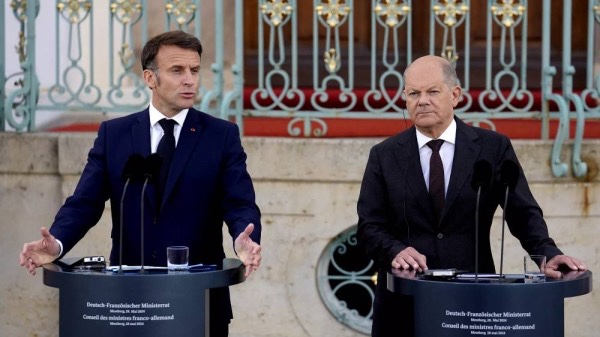Germany, France agree Ukraine may use Western weapons to strike Russian targets

German Chancellor Olaf Scholz and French President Emmanuel Macron showed their joint support for Ukraine during a Franco-German defense and security council in Meseberg on Tuesday.
Whilst Chancellor Scholz had previously been firm on Ukraine not using Western weapons to strike Russian targets, he made a step in the direction of Macron, on the third and last day of the French president’s historic state visit to Germany.
Both leaders put their disagreements aside and compromised on the divisive subject of EU defense.
The German chancellor was also more open in terms of military aid to Ukraine, saying Kyiv should be allowed to hit military sites inside Russia but not other targets – a turning point for Berlin since the chancellor had been reluctant to let Ukraine strike over the border, fearing it could lead to a direct conflict with nuclear-armed Russia.
“Ukraine has every possibility to do this, under international law,” Scholz said. “It must be said clearly, if Ukraine is attacked, it can defend itself.”
“I find it strange when some people argue that it should not be allowed to defend itself and take measures that are suitable for this,” he added.
However, Germany still refuses to deliver long-range missiles (more than 500 km) to Ukraine, unlike Paris and Washington DC.
Russian President Vladimir Putin warned of “serious consequences” if Western countries allowed Ukraine to use their weapons to strike targets in Russia.
For his part, Emmanuel Macron sought to bury the hatchet with Berlin after the latter initiated a European anti-missile shield project, without including Paris.
Other differing views such as economic links to China and the US have also rocked the Franco-German relationship.
While Macron supports greater European independence in defense and wants to shield the economy from ‘unfair’ Chinese and American competition, Scholz underlines the significance of transatlantic ties and trade relations with China.
The goal of the historic state visit was to show a united Franco-German front as both leaders face predicted defeats at the hands of far-right parties less than two weeks before the European elections.
“In France, the far-right Rassemblement National (RN) is leading the polls at 33%, while the Renaissance (Macron’s party) is at 15.5%. Macron’s visit to Germany is also a way of saying, I’m pro-European,” said Marie Krpata, a researcher at the Committee for Franco-German Relations (Cerfa) in Paris.
According to PolitPro’s latest election trend in Germany, the Christian democratic and conservative alliance CDU/CSU is leading with just over 30%. Far-right party Alternative for Germany (AfD) has surpassed Scholz’s Social Democrats (SPD) with the former at 15.8% and the latter at 14.3%.














